Generation Z in Asian countries] Characteristics of Generation Z in each country: Generation Z's view of their own future.
- Release date: Apr 28, 2025
- 3619 Views
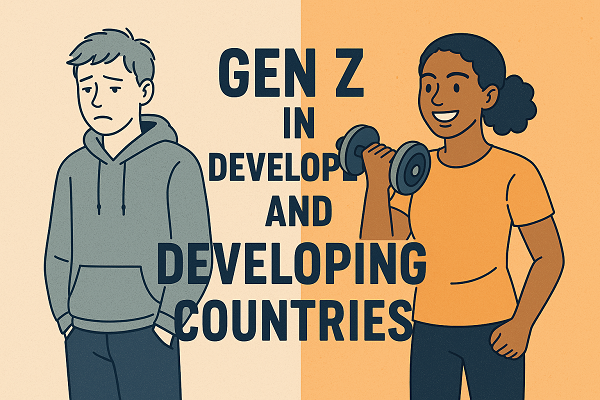
Generation Z refers to the generation born between 1996 and 2010, and will be between the ages of 15 and 29 in 2025. Generation Z will be the core of society in the future. In Japan, people often talk about uncertainty and a lack of hope for the future against a backdrop of higher taxes and reduced pensions, but how do Generation Z members overseas see their future?
In this article, we focus on Gen Z men and women (aged 18-29) in 10 countries, using data from Intage's Global Viewer database of overseas sei-katsu-sha, and present a detailed analysis of their characteristics. This time, we predicted the future image held by Generation Z from four perspectives: “personal economic situation one year from now,” “health,” “desired assets,” and "child-rearing theory. The survey revealed a contrasting picture: Generation Z in developed countries tends to think “I want to maintain my current lifestyle,” while Generation Z in developing countries has a strong positive attitude toward "getting better than now.
The 10 countries are divided into three groups according to GDP per capita (as of 2023): developed countries, semi-developed countries, and developing countries.
Developed countries (GDP per capita over 30,000 USD): South Korea, Taiwan, Hong Kong, and Singapore
Semi-developed countries (5,000-29,999 USD): China, Malaysia, Thailand
Developing countries (under 4,999USD): Indonesia, Vietnam, Philippines
Personal financial situation after 1 year
First, we surveyed what Generation Z thinks about their personal financial situation.
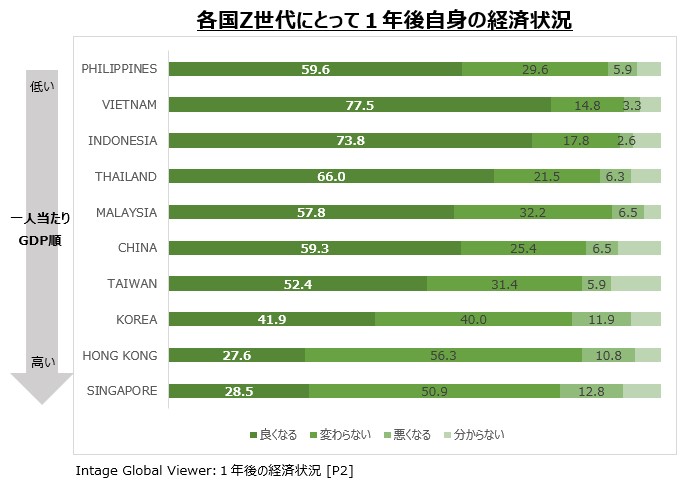
*About Global Viewer
This service provides reports tailored to your issues using questionnaire data on various actual conditions and attitudes of sei-katsu-sha in 11 countries (Asia and US) stocked by INTAGE.
The service covers 400 items, including actual behavioral conditions and awareness, values, and information contact related to various product and service categories.
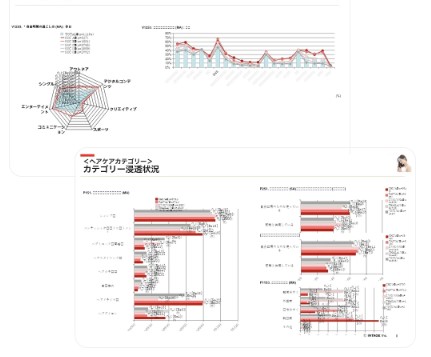
We found that most young people in developing countries have a positive view that their economic situation will be better a year from now. This can be attributed to their expectations for economic growth in their own countries.
On the other hand, while Generation Z in developed countries were not particularly optimistic about an economic turnaround, they were also not strongly concerned about an overall economic downturn. In all countries, Generation Z seems to have a relatively stable outlook on future economic conditions.
Health Philosophy
Next, we looked at how they thought about their health, which is directly related to their life expectancy.
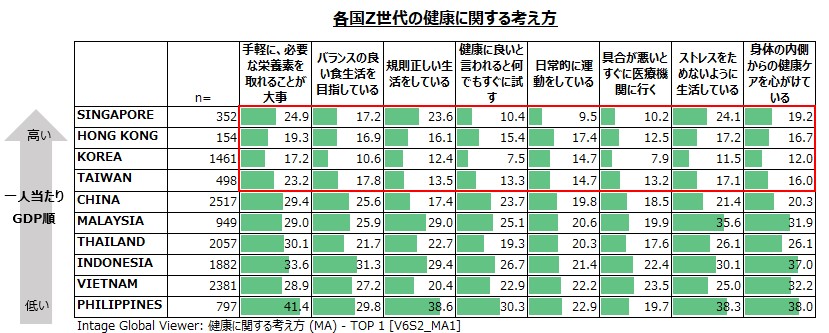
It is clear that the overall percentage of people in developed countries who are aware of healthy habits such as diet and exercise is low. This is thought to be due to a sense of security that a certain level of health maintenance and longevity can be expected without special efforts due to busy lifestyles and improved living environments and medical systems.
On the other hand, many people in developing countries are highly health conscious and take health-conscious actions on a daily basis, such as managing their diet and taking care of themselves from the inside out. This is a strong indication that they are trying to maintain their health through their own awareness and efforts, due to access to medical care and environmental factors.
Assets to be held in the future
As a question closely related to work motivation, we asked respondents about assets they would like to own or increase in the future. Here, we found significant differences in trends depending on the country's stage of economic development.
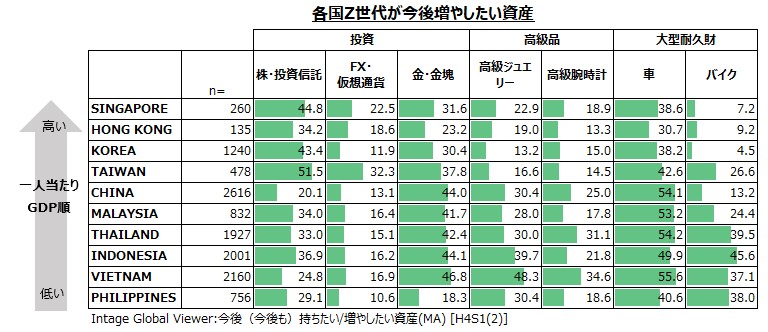
In developed countries, financial assets such as stocks and mutual funds are gaining attention. Cars as assets are not very popular, which may be related to the low intention to own a private car due to the well-developed public transportation system.
Semi-developed and developing countries tended to be more interested in real assets such as gold and gold bullion, fine jewelry, and luxury watches. Furthermore, the intention to own cars and motorcycles was also high, which, unlike in developed countries, can be attributed to the underdevelopment of transportation infrastructure.
Views on Child Rearing
Finally, we asked Generation Z who have children about raising them. We analyze their ideas on how to raise their children in line with predictions of future development in their countries and changes in their environment.
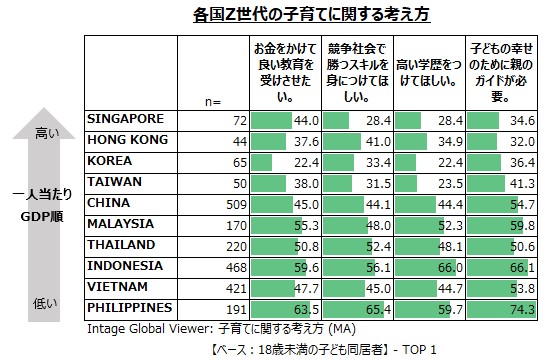
In developed countries, there were fewer parents who strongly demand skills and higher education to win in a competitive society, and their willingness to spend money on education tended to be relatively low. This may be due to the fact that parents themselves have a certain degree of satisfaction with the current situation and do not have much need or motivation to make major changes in their current lifestyle.
In contrast, many parents in semi-developed and developing countries want to spend money on education, arts, and sports to develop their children's skills, and they also seem to find high academic achievement meaningful. They also believe that parental support is necessary for their children's happiness.
Summary and Discussion
Generation Z in developed countries tends to have a strong “status quo” orientation overall. They are also relatively health-conscious, with few actively adopting habits such as eating habits and exercise. In the area of child rearing, the tendency to demand competitiveness and higher education for their children is weak, and the percentage of those who believe that parents should actively guide their children is also low.
In contrast, many Generation Z in developing countries believe that their economic situation will improve in the future, indicating a positive attitude. They are also relatively concerned about their health, and a high percentage of them pay attention to exercise and diet. They also have a strong sense of wanting their children to be competitive and tend to be highly motivated to invest in their education and growth.
Generation Z, a semi-advanced generation, has values that fall somewhere between the two. Their outlook on the economic situation is neither optimistic nor pessimistic, and in terms of health, they are characterized by a relatively high concern for internal health, including stress and mental health care.
Finally.
As we have shown, there are significant differences in the values and behaviors that Generation Z values, depending on the country's stage of development. Looking at the data alone, it would seem that the more developed countries are more status quo oriented and less competitive. However, this could be seen as evidence that the infrastructure is in place for people to lead satisfying lives without intense competition.
Whether this is a good thing or not is difficult to say, but it may be that the values of Generation Z are characterized by a humanistic choice: "If the environment is good, I will naturally choose the path that is easy.
-

Editor profile
Chew Fong-Tat
Malaysian researcher who has lived in Japan for 14 years and has handled many surveys on ASEAN countries.
 Global Market Surfer
Global Market Surfer CLP
CLP


